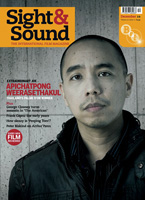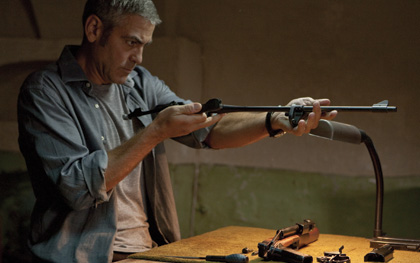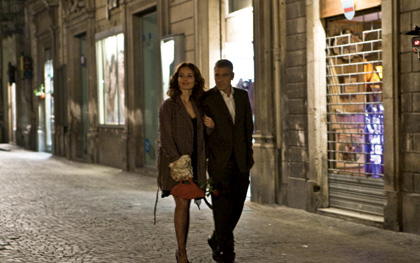Primary navigation

USA / United Kingdom 2010

Reviewed by Michael Atkinson
Our synopses give away the plot in full, including surprise twists.
Jack, a middle-aged American assassin, is holidaying with a new girlfriend in the northern snowy wilderness of Sweden when opposing agents find him. On a frozen lake, he’s forced to kill them all, and also his girlfriend, and then swap identities and flee.
He arrives in Rome, contacts his boss, and is given one last assignment: to build an untraceable rifle for a killing. While in Italy, trying to deal with his paranoia, he meets local prostitute Clara, with whom he falls hesitantly in love.
Jack becomes increasingly suspicious of the Belgian woman for whom he’s making the gun. When he realizes he’s being set up by his own people, Jack attempts to double-cross the double-crossers and escape to freedom with Clara – the Belgian woman attempts to assassinate him with his own gun, but because he modified it, it kills her instead. But in the gunfight Jack is wounded, and slowly begins dying as he makes his way back to his hopeful amorata.
A surprise hit in US theatres this past summer, The American is in fact a double-stunner – a retro-ish Euro-espionage thriller that’s written, acted and directed as if it were still 1974. The film’s formidable resolve, low-boiling story, emphasis on reverie-not-action and huge patches of stillness and quiet suggest an agenda, to make an anti-blockbuster, to hark back to the New Wave era, when texture ruled and narratives often ‘happened’ inside the protagonists’ heads. There’s even a philosophical priest on hand, and a saturation bath in Italian village ambience.
Nobody but George Clooney would’ve got it made – his career choices have routinely harboured the forgotten DNA of the Johnson-Nixon years: the neo-Sinatra heist films, the menopausal dramas (so popular in the American New Wave), the love of old-time broadcasting, the history-drenched political voyages, even rash experiments like Soderbergh’s The Good German (2006) and Clooney’s own Leatherheads (2008), both of them misdirected attempts at literally reincarnating Golden Age genres. Even the Coen films Clooney’s starred in are closer in spirit to the Peter Sellers pictures of the 1960s than contemporary comedies; even the way Clooney is marketed and framed, whether or not the films are inherently nostalgic, still recalls the day and age when he was a boy hanging out with his dad in midwestern TV station newsrooms.

The American is thus perhaps more admirable for its defiance and acidity than it is enthralling. Deliberately, we never learn the context of Clooney’s insulated assassin hero as he warily tries to find anonymity in the mountain villages – who he works for, what he’s done, who’s trying to kill him, why precisely the higher-ups want him dead –and though the upshot certainly rhymes with the character’s disconnect and his own sense of not needing to know, it leaves the film feeling ascetic, filled with vacancies and question marks, and tends to keep the story crawling.
I don’t think I’ve ever seen a Hollywood movie as enraptured with silence. Director Anton Corbijn, vet only of Control and years of music videos, is completely with the Clooney programme, and in a day and age when American films are routinely packed like jack-in-the-boxes with digital cuts and overstated soundtrack madness, he’s made a movie that may be only as pensive and withholding as Clooney et al remember the New Wave movies being. In other words, The American could make even The Ipcress File and The Spy Who Came in from the Cold look positively melodramatic by comparison.
Still, it may be nitpicking to suggest that this is the film’s downside. The American takes some getting used to but it’s mature, fastidiously logical (and therefore skimpy) with exposition, and patient, and arguably this is what audiences have responded to – perhaps Clooney has succeeded, finally, in carving out a hit for the under-served over-35 demographic. It’s not a film that would interest attention-deficit teens, and for that it’s to be celebrated. Clooney himself is closer here to his grim Solaris mode than the gregarious charmer persona that’s made him a star, and his Jack is an utterly convincing nowhere man, lean, decisive, remorseless, yet slowly realising with his ageing that his days are numbered and that he’s missed out on anything human in the process of his career. Conviction grows wobbly with the light-stealing introduction of the often-nude Violante Placido as arguably the most delicious Italian hooker not yet petrified by her day job. But that’s where The American finds its pulp-movie footing again, in the beatific hope of romantic salvation. Placido is so absurdly lovely that on one hand Clooney’s life-changing impulses make perfect sense – I’d kill for her, so would you – and on the other she turns an icy, brooding piece of existential angst – spy-assassin as the modern man without a country or conscience – into pure matinee pop.
Degraded dupes: Amy Taubin on Steven Soderbergh’s strange retro-looking film The Good German (March 2007)
Good Night and Good Luck previewed by Geoffrey Macnab (November 2005)
Syriana reviewed by Ryan Gilbey (April 2006)
Intolerable Cruelty reviewed by Ben Walters (November 2003)
O Brother, Where Art Thou? reviewed by Kevin Jackson (October 2000)
The Perfect Storm reviewed by Andrew O’Hehir (September 2000)
Three Kings reviewed by John Wrathall (March 2000)